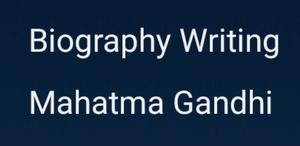Mahatma Gandhi Paragraph Writing // Write a Biography on Mahatma Gandhi in about 100 / 200 / 250 / 500 Words
Mahatma Gandhi Paragraph Writing 100 Words: 10 Lines on Mahatma Gandhi
(1) Mahatma Gandhi was a great freedom fighter.
(2) Mahatma Gandhi was born on 2nd October 1869, in Porbandar, Gujarat.
(3) His full name was Mohandas Karamchand Gandhi.
(4) His father’s name was Karamchand Gandhi, and his mother’s name was Putlibai Gandhi.
(5) Mahatma Gandhi is also known as Bapu and the Father of the Nation.
(6) In 1883, Gandhiji married Kasturba Gandhi.
(7) He started many movements like the Civil Rights Movement, Dandi March, Quit India Movement, etc.
(8) He was a great follower of peace and non-violence.
(9) His birthday is celebrated every year as Gandhi Jayanti.
(10) This great leader of our country died on 30th January 1948.
Mahatma Gandhi Paragraph Writing 200 Words:
Mohandas Karamchand Gandhi was his full name. He was popularly called Bapu. He was the father of the whole nation. Gandhiji was also called a Mahatma, a great man. He was one of the greatest leaders in the world. He was born on 2nd October 1869, in Porbandar, Gujarat. Gandhi was married to Kasturba.
He went to England for higher studies, where he became a barrister. Then he went to South Africa but soon returned to India. He started a non-violent movement against the British and led the freedom movement. He went to jail many times. Finally, he won freedom for India from the British. The partition of the country into India and Pakistan pained him greatly, but he found himself helpless. A misguided man killed him on January 30, 1948. It was a great loss to India. He was our great leader, friend, and guide. We always cherish his memory.
Mahatma Gandhi Paragraph Writing 250 Words:
Mahatma Gandhi, known as Bapu and the Father of the Nation, played a major role in helping India gain independence from British rule. He was born on 2nd October 1869 in Porbandar, Gujarat, and from a young age, he was influenced by the ideas of truth, non-violence, and simplicity. Gandhiji went to England to study law and became a lawyer. His fight for justice began in South Africa, where he stood up against racial discrimination.
When Gandhiji returned to India, he quickly became a leader in the struggle for freedom. He started many important movements, like the Dandi March, the Salt Satyagraha, and the Quit India Movement. Instead of using violence, he believed in peaceful protests and non-cooperation with the British. This method, known as Satyagraha, proved to be very effective. It not only helped India achieve independence but also inspired similar movements in other parts of the world.
The famous poet Rabindranath Tagore gave him the title “Mahatma,” which means “great soul.” People respected and admired him deeply. Gandhiji’s ideas of peace and non-violence are still important today. His birthday, 2nd October, is celebrated as Gandhi Jayanti in India, and it is also recognized worldwide as the International Day of Non-Violence. Gandhiji’s life shows us the power of truth and love, and his teachings continue to inspire people all over the world.
Mahatma Gandhi Paragraph Writing 500 Words:
Mahatma Gandhi was one of the most influential leaders in history, known for his role in India’s fight for independence. He believed in non-violence and truth, which guided his actions throughout his life.
Early Life and Education:
Mahatma Gandhi was born as Mohandas Karamchand Gandhi on 2nd October 1869 in Porbandar, Gujarat. His father, Karamchand Gandhi, served as the Chief Minister (Diwan) of Porbandar, and his mother, Putlibai, was a deeply religious and noble lady. Gandhi was sent to school at the age of seven. Though he was not a bright student, he was known for his honesty and hard work. At the age of thirteen, he was married to Kasturba. He passed the entrance examination at seventeen and then traveled to England to study law at the Inner Temple.
Gandhi’s Work in South Africa:
After becoming a barrister in 1891, Gandhi returned to India but struggled to establish a successful law practice in Rajkot and Bombay. In 1893, he went to South Africa to work on a legal case. There, he was deeply moved by the harsh treatment of Indians and other dark-skinned people by the British authorities. In response, Gandhi began organizing non-violent protests and civil disobedience campaigns, successfully drawing attention to the injustices faced by the oppressed communities in South Africa.
Leadership in India’s Freedom Struggle:
In 1915, Gandhi returned to India and quickly became a leader in the Indian National Congress. He traveled across the country to understand the problems faced by farmers, peasants, and urban laborers. Gandhi launched three major mass movements that played a crucial role in uniting the Indian people against British rule: the Non-Cooperation Movement, the Civil Disobedience Movement, and the Quit India Movement. These movements were instrumental in pressuring the British to leave India, leading to the country’s independence.
Gandhi’s Principles and Social Reforms:
Gandhiji’s main principles were truth (Satya) and non-violence (Ahimsa). He was a man of simplicity and strong moral values. Gandhi believed in treating all human beings with respect, regardless of their caste, color, language, creed, region, religion, or ethnicity. He worked tirelessly to uplift the untouchables, whom he called “Harijans,” meaning “children of God.” Gandhi also promoted self-reliance and encouraged people to spin their own cloth using a spinning wheel, which became a symbol of the Indian Independence Movement.
Legacy and Assassination:
Mahatma Gandhi played a major role in securing India’s independence, but he did not live to see the long-term fruits of his struggle. On 30th January 1948, Gandhi was assassinated by Nathuram Godse, a man who opposed his efforts to reconcile Hindus and Muslims. Gandhi’s death was a great loss to the nation, but his legacy of truth, non-violence, and social justice continues to inspire people around the world. His birthday, 2nd October, is commemorated as ‘Gandhi Jayanti,’ a national holiday in India, and is also observed globally as the ‘International Day of Non-Violence.’
Read also: Neeraj Chopra Biography Writing

